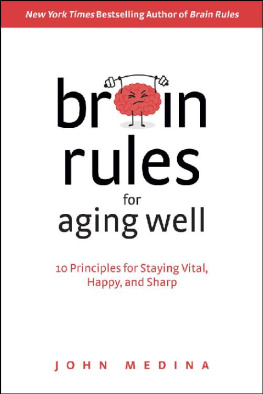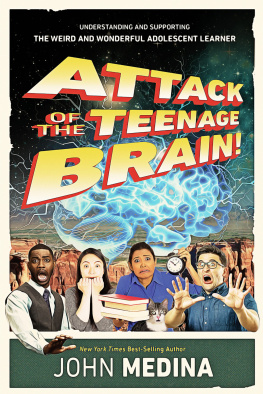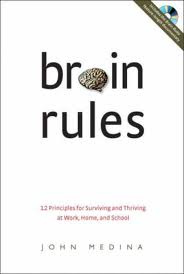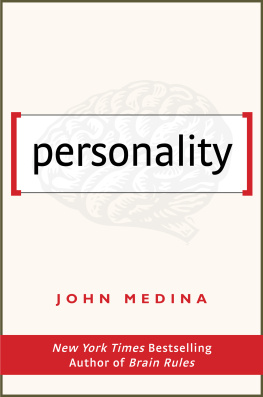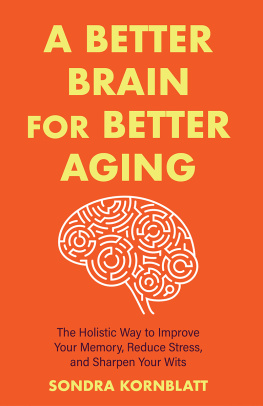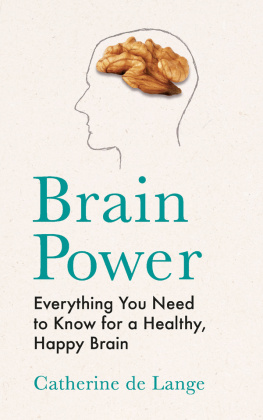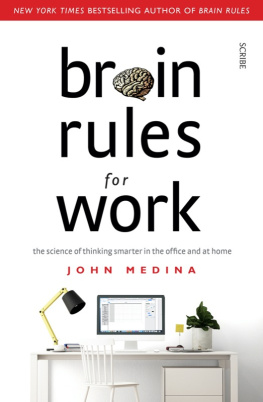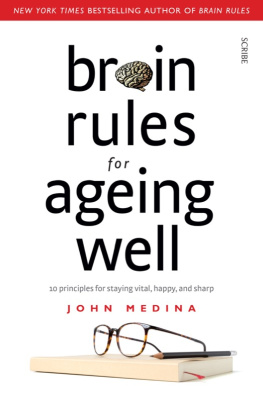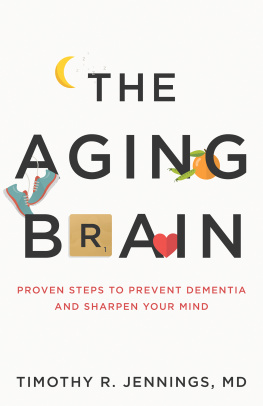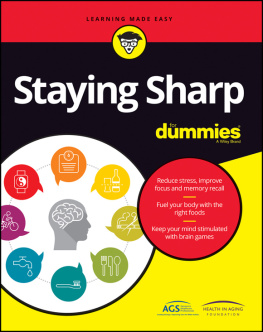about the author
JOHN MEDINA is a developmental molecular biologist and research consultant. He is an affiliate professor of bioengineering at the University of Washington School of Medicine. He was the founding director of two brain research institutes: the Brain Center for Applied Learning Research, at Seattle Pacific University, and the Talaris Research Institute, a nonprofit organization originally focused on how infants encode and process information. Medina lives in Seattle, Washington, with his wife and two boys.
VIDEO BONUSES
www.brainrules.net

Watch key principles on aging come to life
In his signature animated style, John Medina guides you through the effects of aging, plus what you can do for both your brain and your body.

Take a lively tour of the 12 original Brain Rules
This 45-minute film features John Medina on the 12 original Brain Rules for home, work, and schoolfrom Exercise boosts brain power to Sleep well, think well.

See Brain Rules parenting concepts in action
John Medina hosts fun videos on speaking in parentese, the cookie experiment, dealing with temper tantrums, and more. Plus, take our parenting quiz.


BRAIN RULES FOR AGING WELL. Copyright 2017 by John J. Medina.
All rights reserved.
No part of this book may be used or reproduced in any manner whatsoever without written permission except in the case of brief quotations embodied in critical articles or reviews.
Requests for permission should be addressed to:
Pear Press
P.O. Box 70525
Seattle, WA 98127-0525
USA
This book may be purchased for educational, business, or sales promotional use. For information, please visit www.pearpress.com.
FIRST EDITION
Edited by Tracy Cutchlow
Cover designed by Nick Johnson
Library of Congress Cataloging-in-Publication Data is available upon request.
ISBN-13: 978-0-9989192-2-5
10 9 8 7 6 5 4 3 2 1
To Sir David Attenborough, role model and mentor-at-a-distance, for the continual reminder that science doesnt make truces with truth.
contents
what causes us to age ~ how the brain is wired ~ why old age can be some of the happiest years of your life
vitamins for the brain ~ more parties, less flu ~ where social isolation leads ~ video chats ~ the human touch
happier or grumpier? ~ roller-coaster grandpa ~ gullibility and the Highway to Hell ~ dopamine and depression ~ the power of gratitude
the thermostat of the stress system ~ how you feel about aging changes the way your brain ages ~ gender differences ~ stress and mindfulness
many types of memory ~ what declines, what stays robust, what improves how the brain battles back ~ Mikey likes it, and you will too
how processing speed changes ~ problem-solving abilities vs. intelligence drawn from experience ~ stunning results from playing video games
what your doctor cant tell you ~ mild cognitive impairment vs. Alzheimers 10 warning signs ~ the amyloid hypothesis and the Nun Study ~ predicting Alzheimers in your 20s?
a little exercise goes a long way ~ less food, longer life? ~ two diets that improve working memory and lower the risk of Alzheimers
why do we sleep? two breakthroughs ~ the battle of the sleep cycle ~ how sleep fragments as you age ~ a good nights sleep starts four hours before
what Super Agers can teach us about long life ~ a gene found to extend life ~ how cells know to die, thus avoiding cancer ~ a pill for aging?
retiring from a job raises your risk of disability, disease, depression, and dementia ~ nostalgia is good for you ~ the Blue Zone ~ an hour-by-hour plan for retirement
10 brain rules for aging well
I PRESENT IN THE pages of this book everything you need to know about why you are aging. And I am going to use brain science to show how you can make life a surprisingly fulfilling experienceat least for your brainin the years you have left. We begin with a group of seventy-year-old men in the capable hands of famed Harvard researcher Ellen Langer.
Livelyalmost childlikethe seventy-year-old men skipped out of a monastery one fine morning. Theyd just spent five days living in the old building, under observation by Langer. Now the men were leaving for homesmiling, happy, active, laughing. It was the fall of 1981, the first year of Ronald Reagans administration, and the men had the same sunny abandonment associated with our fortieth presidentwho, coincidentally, was exactly their age. But these seniors, as part of Langers research project, had just been through a time warp. Their brains had spent the past workweek not in 1981, but in 1959. The monastery was filled with songs like Mack the Knife and The Battle of New Orleans. On the black-and-white TV, the Boston Celtics beat the Minneapolis Lakers in the finals (yes, Minneapolis Lakers) and Johnny Unitas played for the Baltimore Colts. Issues of Life magazine and the Saturday Evening Post lay about. Ruth Handler had persuaded Mattel to create a thin, full-figured doll named after Ruths daughter, Barbie, and then market it to little girls who had yet to undergo puberty. President Eisenhower had just signed into law the Hawaii Admission Act, creating the fiftieth state.
That walk down memory lane was the reason the men were so happy as they left the monastery. Waiting for the bus to take them home, a few entered into a spontaneous game of touch footballan activity most had not done for decades.
You might not have recognized these men 120 hours previously. They were shuffling, with poor vision, hearing, and memory; some of the men required canes to walk into the monastery. A few could not carry their suitcases up to their rooms. Langer and her team had poked and prodded the mens bodies and assessed their brains. These baseline tests proved one thing: before entering the monastery, the men were stereotypically old, as if ordered from Central Casting under the request Eight infirm seniors, please.
But they didnt stay infirm. At the end of their stay, they underwent the same tests. Reading about the quantifiable change took my breath away. Even a casual visual inspection of these seniors revealed that something dramatic had happened, as the New York Times reported. Their posture was more robust. Their hands gripped more tightly. They handled objects with greater dexterity. They moved more easily (touch football, for heavens sake!). Their hearing had sharpened. Same with their vision. Yes, vision. A sampling of their conversation would have told you something in their brains had dramatically improved too, and this impression would be proved by a second round of IQ and memory tests. In honor of its extraordinary finding, the experiment has been christened the counterclockwise study.
The book you have in your hands is all about what happened to the men during those five days. And what will happen to you, statistically speaking, if you follow the advice in these pages. Such optimism is rare for me. Im a grumpy neuroscientist. That means every scientific sentence in this book describes something published in the peer-reviewed literature, often replicated many times. (See www.brainrules.net/references.) I specialize in the genetics of psychiatric disorders. But if you think aging is all about debilitation, you may want to spend some quality time with another point of view, like Langers. Or the one in this book.
Next page
